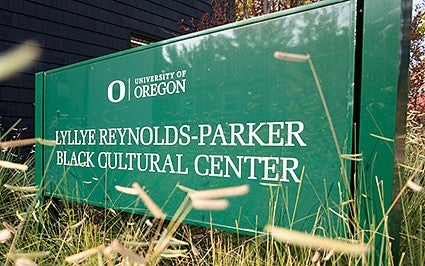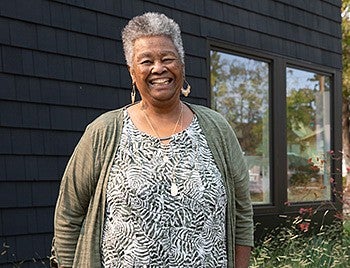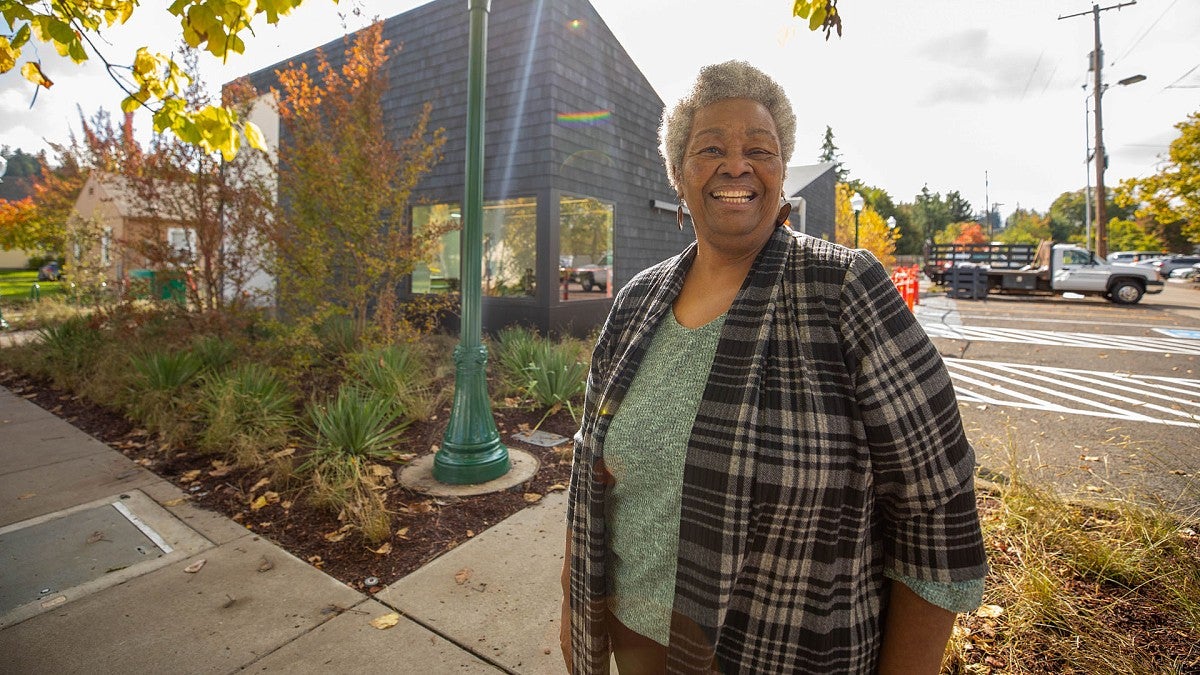Lyllye Reynolds-Parker, a beloved former academic adviser to University of Oregon students and a member of one of Eugene’s first Black families, died Thursday, Aug. 22. She was 78.
Her impact on students throughout her 17-year career at the UO inspired a unanimous vote of the University of Oregon Board of Trustees to name the new Black Cultural Center building in her honor. The 2019 vote made Reynolds-Parker the first Black woman — and the first living person — to have a campus building named in her honor.
“It’s just overwhelming,” she said at the time. “Never dreamed it would happen. Was not even in my imagination. I loved my job, so I did my job. My bonus in doing my job was I met some wonderful students, and I developed some great relationships. And that’s a payday that you just can’t take to the bank.”

Because to her, watching the trajectory of the students' lives she worked with provided its own reward.
“I look at these young people and I just marvel,” she said. “I just marvel at who they are and take pride in the fact that I was a part of the team that paved the way for them to grow and reach their potential.”
Reynolds-Parker’s approach to supporting students stood out right away to Aris Hall, the first director of the Black Cultural Center.
“Meeting Ms. Parker on my first day is one I will always remember,” Hall said. “She was so excited about the decision to name such an important space at UO after her. As I watched her interact with some students, she was invested not only in what they were studying but who they wanted to be in the world. She encouraged them, and every chance we had to interact in the few years I was able to know her she would continue to pour into me and any students she met.”
Reynolds-Parker was born May 8, 1946, at Sacred Heart Medical Center. Her parents, Sam and Mattie Reynolds, moved from Louisiana to Eugene in 1942, one of the first Black families to settle in the area. The couple helped found St. Mark Christian Methodist Episcopal Church, the city’s oldest Black congregation. The church now stands on a street named in honor of Sam Reynolds. The name of a nearby park remembers Mattie Reynolds, who in 1966 became the first Black person to run for public office in Eugene when she sought a seat on the city council.

Inspired by her mother, Reynolds-Parker became active in civil rights and social justice causes while a student at Sheldon High School, where she was a member of the first graduating class.
Later, as a single mother of two, she took a job with the railroad to support her family.
Then at age 40, two close friends told her she was “college material.”
“I’d not heard that before,” Reynolds-Parker said.
To the contrary, an eighth grade guidance counselor had steered her in another direction, asking her to rewrite an essay on the topic of who she wanted to be when she grew up.
Reynolds-Parker wanted to be Thurgood Marshall.
“He was a powerful man,” she recalled in 2019. “And I thought, I want to be like him. I want to help people. I want to help my people like he’s doing.
But the guidance counselor was less than supportive.
“She said, ‘You know, Lyllye, you’re not only a Negro, you’re a girl,’” Reynolds-Parker said. “’You will never be an attorney. You need to go back and rewrite your essay. Home economics, cosmetology, nursing, those are fields you can probably go into.’ And because she was an administrator, I took her words to the bank.”
But in 1986, Reynolds-Parker enrolled at UO — and took another step towards fulfilling a commitment she made to herself when she was 12: she would support young women and young women of color to be whomever they want to be if given the chance.
As a student, Reynolds-Parker found herself studying with classmates half her age.
“I just so enjoyed being with those young folks because they pushed me,” she said. “They all wanted to study with me because they thought at my age, I knew everything. And I let them think that because I wanted to study with them.”
A member of the Class of 1991, Reynolds-Parker was working at Eugene Hospital and Clinic a few years later when someone told her about an academic adviser opening in the Office of Multicultural Academic Success, the precursor to what is now the Division of Equity and Inclusion's Center for Multicultural Academic Excellence at the UO.
She took the job — and took to the work. Reynolds-Parker said she fell in love with her colleagues and found she bonded quickly with students, especially first-generation college students.
“I just so enjoyed being with those young folks because they pushed me,” she said. “They all wanted to study with me because they thought at my age, I knew everything. And I let them think that because I wanted to study with them.” — Lyllye Reynolds-Parker
“Every student that leaves home and goes anywhere takes baggage,” she said. “Some students can pack their baggage in a matchbox. Other students have to have a couple of railroad cars. You had to take all of that into consideration when advising students."
Her consideration of how best to support student success left a lasting impression on the campus community, evidenced by the testimony submitted in support of naming the Black Cultural Center in her honor.
“I have known Ms. Parker since I came to Eugene 16 years ago as a freshman in college,” wrote Andiel Brown, director of gospel choirs and ensembles at the University of Oregon. “She is the reason I earned my degree and found my academic and career passion.”

Iton Udosenata, who earned his bachelor’s, master’s and doctoral degrees from the UO, weighed in from his perspective growing up in Eugene. Udosenata, who was principal at North Eugene High School at the time, now serves as superintendent of the Tigard-Tualatin School District.
“The University of Oregon has a timely opportunity to bridge a cultural divide between its institution and the local Black community by honoring a local icon who has done so much for our school and our community,” he wrote. “The University of Oregon has an opportunity to break the pattern of looking outward to fill the void of cultural representation on campus; and change the experiences of kids, like me, who will one day attend UO. By naming the new Cultural Center after Ms. Parker you will be sending a message to those kids as well as Eugene’s Black community that says, “We see you, you are part of our story, you matter.”
And her influence and outreach touched students from diverse backgrounds.
“I hope to walk past the Black Cultural Center one day and tell my son, this building is named after Aunt Lyllye Parker, a woman that helped many of us in the UO Native American student community,” wrote Stephanie Tabibian, a UO alumna and member of the Shoshone-Paiute Tribes.
Those who knew Reynolds-Parker said she will be deeply missed, but they said her legacy will endure and her life will continue to be an inspiration to others.
“Whether you were meeting her for the first time or had known her for years, Ms. Parker knew how to make everyone feel included and that they belonged,” said Hall, the director of the Black Cultural Center. “This is a big loss for the Eugene and UO community. As we celebrate the fifth anniversary of the BCC this year, the LRP Black Cultural Center looks forward to recognizing her dedication to activism and commitment to both the UO and the greater Eugene-Springfield community.”


